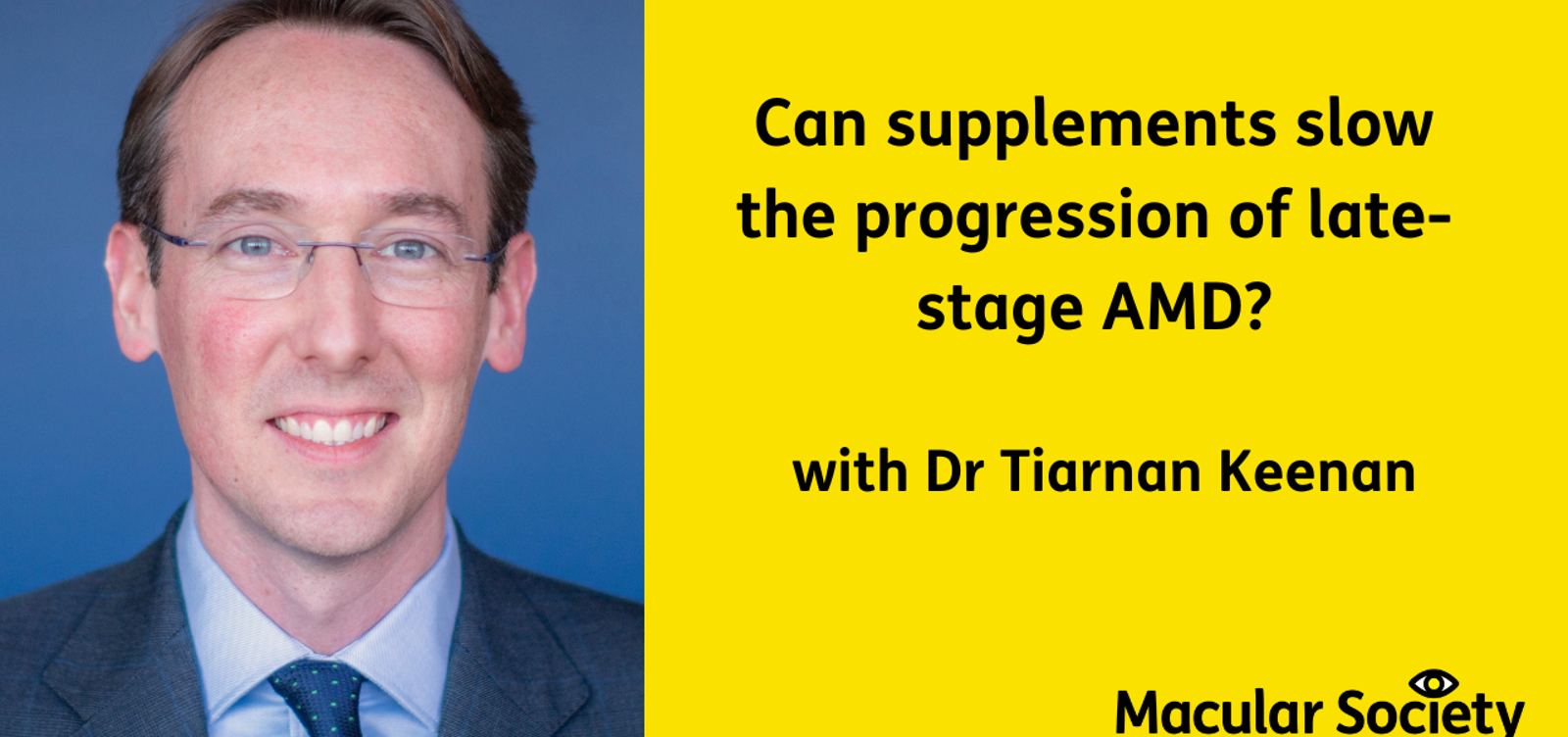Supplements offer hope for advanced AMD, says researcher
Posted: Monday 25 November 2024
In a recent My Macular and Me webinar, Dr Tiarnan Keenan, a clinician scientist at the National Eye Institute in the US, shared groundbreaking insights into the benefits of AREDS2 supplements for people with geographic atrophy (GA), an advanced stage of dry age-related macular degeneration (AMD).
His research brings hope to those affected by GA, as the research shows that supplements could play a crucial role in slowing disease progression.
Dr Keenan, a researcher focused on adult retinal disease, explained that these findings mark a significant step forward as previously these supplements, based on the AREDS2 formula, have only been recommended for those with earlier stages of AMD.
Slowing the rate of progression
In the webinar Dr Keenan explained how the research suggests that in cases of GA, where the areas affected are outside the central part of the macula (fovea), AREDS2 supplements could slow the rate of progression by as much as 55%.
If the fovea remains unaffected, it is known as foveal sparing.
“This finding is particularly exciting,” he said.
“This study suggests that even individuals with advanced dry AMD, as long as the central macula isn’t yet affected, can benefit from these supplements,” said Dr Keenan.
But, he highlighted that there is no evidence to suggest supplements help once the fovea has become affected.
A simple and safe option
Comparing the emerging treatments for GA, which include eye injections Dr Keenan said AREDS2 supplements were cost-effective, non-invasive, and have a strong safety record. “These supplements have been used in the ophthalmology community for over two decades with an excellent safety profile.”
Dr Keenan and his team aim to confirm these findings with a bigger study. But, he emphasised that for people with GA that doesn’t affect their central macula, starting AREDS2 supplements is a low-risk option with significant potential benefits.
“There’s very little to lose,” he said, “and we even have some indications that they may help preserve visual acuity for longer.”
Dr Keenan expressed his excitement about the potential for an AREDS3 study. He said: “If we're able to launch that, there may be two parts to it. One of them would be trying to look at this question of whether supplements really do slow down the growth of geographic atrophy to the centre.
“But then the other large part of that would be seeing if there are other parts of oral supplementation that we can add in that would be even more effective. Maybe looking at people with early AMD where we don't have anything to offer yet and seeing if supplements could be effective at that stage, if we design the study appropriately.”
Diet and eye health
Dr Keenan also highlighted the importance of future research which will look at the gut microbiome and the role it could play in eye health.
He said: “All the bugs that live inside our intestine may be a really important part of that story. There are things like lutein, zeaxanthin, and if they are effective, they're probably effective because they go directly to the macular.
“But there are other parts of our diet, or possibly even supplements, that are effective, not in such a direct way, but because they promote a healthy gut bacteria that is in turn effective, is, in turn beneficial for the eye. We're starting to learn about those kinds of things, but I think we're just scratching the surface. So that's a massive area where we'll learn about.”
Watch Dr Keenan's talk below:
Catch up on our previous webinars
Catch up with any webinars you missed, or watch again in your own time.
Explore our research
Beating macular disease through funding medical research and improving the lives of those living with macular disease.





